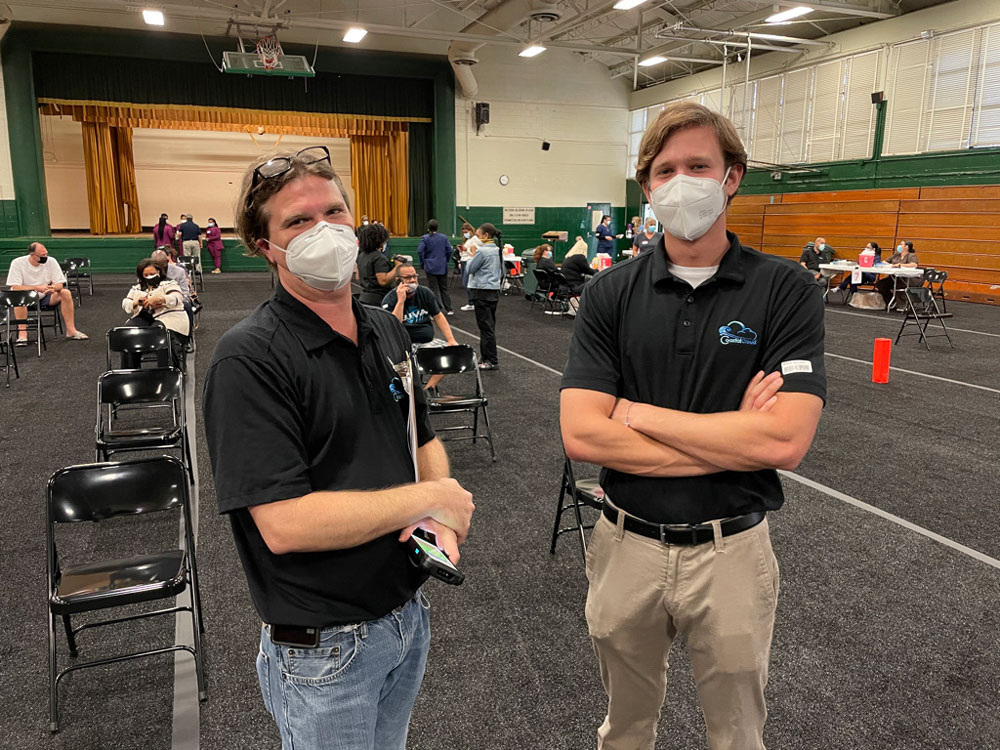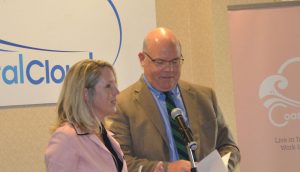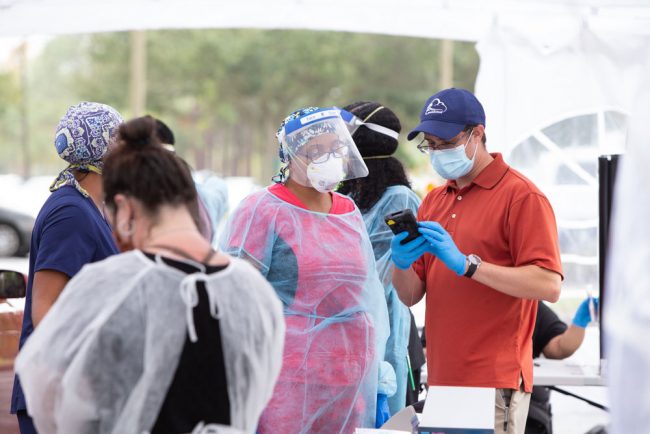
Last spring, while people all over the world were paralyzed with fear over the rapidly spreading coronavirus, Tim and Sara Hale got to work on something they’re not unfamiliar with as entrepreneurs: taking a big risk. It’s what got them to Palm Coast, after all.
The Hales are the owners and founders of Coastal Cloud, an eight-year-old Flagler-based consulting, implementation and managed services company. They create software and IT solutions for a range of businesses and sectors, including Palm Coast government, for whom the company built the Palm Coast Connect portal gratis. Seeing how dangerous and immediate the coronavirus was, the Hales decided to build a platform that could help facilitate covid-testing and scheduling for government agencies looking to monitor the disease’s spread.
“We spent spring break building the first platform, and we said, this is either going to be a big opportunity for us, or we’re going to have to let people go,” Tim Hale said over Zoom last week. “We didn’t have a contract or agreement from anyone to buy this. No one knew what was going to happen, and it could’ve really hurt us. But we decided to take the risk and build it.”
One year later the Hales’ gamble appears to be a considerably successful one. In just 12 months Coastal Cloud has doubled its workforce and created a platform first for testing, and now for scheduling vaccinations, that is the envy of much-larger companies and states across America.
A half-dozen counties, and at least 30 sites that are either federally or state run, are operating smoothly in scheduling appointments and administering vaccines through platforms developed by Coastal Cloud and its partner, Florida-based consulting conglomerate CDR Maguire.
Since Dec. 23, when Coastal’s scheduling platform went live, more than 700,000 Floridians have been vaccinated through their system, with 300,000 more appointments scheduled. A total of 2 million people have created accounts for Covid-19 testing, the company said as of the middle of last week. Because the speed of vaccinations has ramped up, the numbers are quickly outdated.
“It’s a little bit like a David and Goliath situation here,” Tim Hale said. “You have a lot of major tech companies who have struggled with this, and we’re a little tech company in Florida that’s had success. It’s extremely gratifying.”
If David were carrying an invisible piece of technology instead of a slingshot, Tim Hale’s metaphor would be perfect. As it is, Coastal Cloud’s success seems surprising but is in line with everything else the company has done in its short existence in Flagler County.
While other sectors of their business slowed down due to the pandemic, particularly their work with non-profits, the success of the testing and vaccine platform, which the company calls the Care4Covid Solution, has boosted Coastal Cloud immensely.

Many large software and scheduling companies across America have struggled with vaccine systems, with states from New York to California having system crashes, duplicate appointments, and an overall sense of “I finally can get the vaccine, and now you’re telling me there are NO slots available?” level of frustration from the general public.
“You’ve got these big companies, some of which are government-run, and they’re having technology problems with websites that can’t handle the volume of traffic they’re getting, or appointments are not booked correctly, and they’re just not working,” Sara Hale said. “And we’ve had situations with our solution where 650 people per second are on our sites, and 60,000 people register in 12 minutes, and it’s running smoothly.”
After building their demo platform last spring, Coastal Cloud showed it to potential buyers like the Florida Division of Emergency Management. The division had previously contracted Coastal Cloud to build a grants management system using the same technology platform (through Salesforce).
Once Emergency Management liked what it saw, it connected the Hales with CDR Maguire, who partnered with Coastal Cloud and contracted with counties and the state, as well as FEMA, the Federal Emergency Management Administration, to help manage the unprecedented job of Covid vaccinations.
One reason CDR Maguire CEO Tina Vidal said that Coastal has succeeded where others have failed is its relative small size and adaptability.
“A lot of software companies are very slow to react, and slow to pivot toward changes,” Vidal said in a phone interview. “When you’re in a massive health space and need to respond quickly, that’s a big problem. Coastal can pivot and respond quickly to changing needs, and make changes to the system. There are so many challenges, but they’ve done an amazing job.”
Since the launch of the Care4Covid Solution platform a year ago, business has been brisk, with many employees working round-the-clock to keep the operations running smoothly and respond to changes, many coming from near-incessant eligibility rules changes ordered by Governor Ron DeSantis.
Coastal employees are spread all over Florida at vaccination sites, helping train National Guard soldiers in the technical aspects of the system, as well as assisting nurses and other health care personnel.
“The rules change constantly so we have to adapt and adjust the software all the time,” Sara Hale said. The vaccination “sites close at 7 p.m., and we have to put enhancements into the system every night, and they all have to be tested to see if they work. The software has to be working by 5 a.m. because we have to train people on the new parts of the system so they’re ready when the sites open again at 7 a.m.”
All of that tweaking and changing, allowing thousands more Floridians to sign up every day, is mostly possible thanks to the scalability of SalesForce, Tim Hale said.
“Most of these systems have the same technical challenges, but because we’re built on a great platform we can respond very fast and keep running smoothly,” he added.
“It’s really been an amazing effort from our team, but from public and private sectors, from the National Guard to the volunteer firemen, and nurses donating their time, in this fast-paced environment, it’s been incredible to see,” Sara Hale said.
“And the appreciation (our employees) are getting at the sites is amazing,” she added. “People are coming back after their shots and bringing cupcakes and brownies for everyone.”
Quite a few of the new Coastal employees are either interns or new hires and come from Flagler County ranks, including students like Mackenzie Smith, a Matanzas graduate now taking classes at Seminole State College in Orlando. Smith has been assisting at vaccination sites all over Florida, helping train National Guard soldiers on using the software correctly, and quickly adapting to changes.
“I’ve been IT support helping familiarize everyone with the platform, and going from Tampa to Tallahassee to Jacksonville,” Smith said. “Each site has been different, but what mostly I’m seeing is awe at how thankful and excited people are to be going through this process.” (The gratefulness isn’t necessarily exclusive to Coastal Cloud-enabled sites of course: there’s an inherent joy and relief common at vaccination sites, as when a group of school employees broke out in dance after getting their shots at Flagler Palm Coast High School earlier this month.)
The hope–the plan–is for most Americans to be vaccinated by year’s end. With some 2.5 million Americans getting a shot every day at today’s average (1.66 million of them getting their first shot), the Centers for Disease Control’s projection is that 50 percent of the population would be vaccinated by May 11, 70 percent by June 20, and 90 percent by the end of July. The projections do not take into account resistance to getting vaccinated, a separate issue fraught with ideological baggage. Regardless: the pace of vaccination is brisk and an end-point at least in view, which begs the question: won;t Costal Cloud’s platform soon be obsolete?
The same program can be used for future crises, Tim Hale says, and extra employees hired during the covid emergency will likely stay on and work on other projects. For now, the focus is on managing the current emergency, though not without a touch of pride, evident in conversations with the Hales, about how a small company headquartered on the scenic edge of Florida’s northeast corner is playing a role in combating the worst pandemic in a century.
“We’re technology people: It’s rare we get to affect people’s lives like this,” Tim Hale said. “To help in a public health way, and help people get back to work, and their kids back to school … we’re so happy to be able to do this.”
![]()






























erobot says
This is an excellent example of how our country grew and people prospered. No grants, no taxpayer money squandered, no huge bureaucracy to feed — just American ingenuity at work. I hope they are a model for other bright youngsters.
Toby Tobin says
What a wonderful local-focused story. A great success story.
HAL9000 says
Once again Coastal Cloud and their big brother Salesforce.com have injected themselves into public government affairs, and once again with little to no oversight and due process. Sure, on the surface all this looks grand and pretty for the presses. Look how wonderful this private public partnership is doing. We’re saving lives.
But, who has access to that data and what are you doing with it? Knowing about my swales and garbage collection issues are one thing. Having my medical history and even DNA is another.
I will always try not to do anything with Palm Coast Connect, and I will never get a Covid test nor vaccine. Right now due to the pandemic its the wild wild west of personal privacy data collection and mining with next to zero protections or consequences for the sharing of that information. No thank you, I’ll just wear a mask and stay the hell away from folks.
flatsflyer says
So what is the plan and schedule for there new building on land they bought last year at the foot of the Hammock Bridge, the old tennis club site?